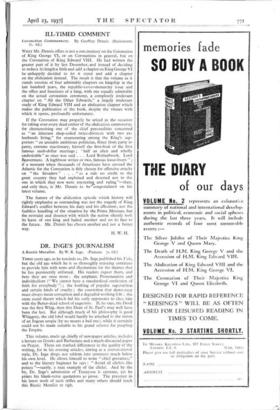DR. INGE'S JOURNALISM
A Rustic Moralist. By W. R. Inge. (Putnam. 7s. 6d.)
THREE years ago, as he reminds us, Dr. Inge published his Vale, but the old age which he is so thoroughly enjoying continues to provide him with texts and illustrations for the themes that he has persistently enforced. His readers expect them, and here they are once more : the emphatic Protestantism and individualism (" We cannot have a standardised confession of faith for everybody ") ; the loathing of popular superstition and certain kinds of cruelty ; the conviction that demo racy must always mean corruption and a degraded working folk ; the stern social theory which led his early opponents to class him with the Better-dead school of eugenists. If, he says, the Devil was the first Whig, then this Dean of St. Paul's may well have been the last. But although much of his philosophy is good Whiggery, the old label would hardly be attached to the vision of an Ingean utopia (by no means a bad one), while it certainly could not b.: made suitable to his grand scheme for peopling the Empire.
This volume, made up chiefly of newspaper articles, includes a le-cture on Greeks and Barbarians and a much-discussed paper on Prayer. There are marked differences in the quality of the writing, for in his evening articles, aiming at a conversational style, Dr. Inge drops not seldom into sentences much below his own level. He allows himself to write " chief gravamen," and to the literary beginner he says : " Avoid all clichés like poison "—surely, a neat example of the cliché. And by the by, Dr. Inge's admiration of Tennyson is extreme, yet he prints his blank-verse quotations as prose. The presencc in his latest work of such trifles and many others should teach this Rustic -Moralist to sigh.










































 Previous page
Previous page